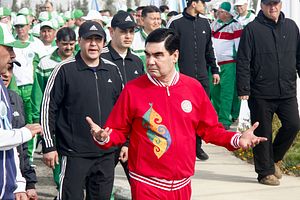Turkmenistan’s golden age is turning out to be quite a lackluster era, rife with disasters on the economic and environmental fronts. As Turkmen dust salt off their crops (literally), the country’s Turkish business partners have begun airing complaints that Ashgabat isn’t paying its bills.
Oguzhan Cakiroglu, a board member at Cakiroglu Grup, a Turkish metals and construction company, told Reuters recently that the Turkmen government “has run out of financial resources, and it hasn’t been paying for finished contracts, let alone being able to pay for new ones.”
A building spree over the last few years — including resorts in Avaza, a sparkling new, bird-shaped airport, and sporting facilities — belied the state of the Turkmen economy. Rising complaints and halted projects are chipping away at the thin veneer applied by Ashgabat that all is well.
According to Reuters, Cakiroglu Grup has stopped operating in Turkmenistan, and it’s not the only company to do so. Polimeks, the Turkish contractor that completed the $2.3 billion airport in Ashgabat, reportedly stopped work on a highway project from Ashgabat to Turkmenbashi on the Caspian Sea earlier this year. Opposition Turkmen media claimed in late February that Turkmen officials proposed that the company build the road on its own dime with the promise to take profit from tolls once the project was completed. The report claimed that chairman of the Polimeks board, Erol Tabanca, refused the proposal, halted construction, and left the country. In a dramatic turn, the report alleges that as he was leaving the country Turkmen authorities tried to stop him, resulting in a fight. The report also claimed that Polimeks and other subcontractors have not been paid for the airport work, either.
Turkey has a major Turkmen trading partner for more than a decade, investing an estimated $1.5 billion between 2002 and 2016. In 2015, 33 percent of Turkmenistan’s imports came through Turkey. As such, Turkish companies have been the most prominent partners for Turkmenistan’s building craze. In addition to the airport completed in 2016, starting in 2012 Polimeks built of a number of high-rise, fancy hotels in Avaza.
But it’s not just Turkish companies that are having difficulties with Ashgabat of late. Reuters cited two Belarusian government sources as saying that Turkmenistan has not fully paid a Belarasian state-owned company, Belgorkhimprom, for the construction of a potash fertilizer plant completed in March 2017. The deal to build the Garlyk potash mining and processing plant, worth about $1 billion, was settled in 2010. After serious delays, the plant was completed in spring 2017 but Belarusian official complained that full payment was not forthcoming. When Turkmenistan opened a new plant project, worth $1.4 billion, for bids, the Belarusian company declined to submit a tender.
Reuters also reported that an executive at a Western company that used to supply oil and gas equipment to Turkmenistan shut its offices there late last year. Another Western executive, Steve Crabtree of DRC International, which is a U.S.-based technical procurement and distribution company for the mining, oil, and gas and construction industries, told Reuters in an email that despite “good traduction in the early days” conditions had changed. “But sadly, those days are far behind us and it’s a whole new ball game… I have cut expenses, replaced management, and keep pushing forward. I’m hopeful that conditions change for the country and we can get back to supporting great projects.”
Other companies mentioned in the Reuters report, such as Korea’s Hyundai and French firm Bouygues Construction, reported no difficulties with payments from Ashgabat.
When viewed in light of food shortages, cash withdrawal denials for Turkmen residing abroad, and Turkmen being denied boarding on flights out of the country, the complaints of Turkish and other businesses about non-payments further underscores the notion that all is not well in Ashgabat. While some companies are getting paid and others are still willing to take the risk and bid on Turkmen projects, Turkmenistan looks to be behind on its bills to others.

































